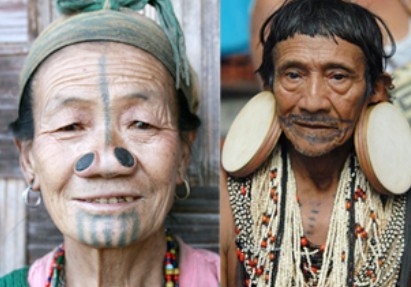Why in the News?
The facial tattoos and wooden nose plugs of Apatani women in Arunachal Pradesh, banned in the 1970s, now survive only among older generations, giving them anthropological importance.

About Apatani Tribe:
- Overview: A Scheduled Tribe (ST) concentrated in Ziro Valley, Lower Subansiri district, Arunachal Pradesh.
- Language: Part of the Tani linguistic group, speaking a dialect of the Tibeto-Burman family.
- Belief System: Paganistic faith worshipping the Sun (Ayo Danyii) and Moon (Atoh Piilo).
- Festivals: Dree (prayers for harvest and prosperity), Myoko (friendship bonds), along with Yapung and Murung.
- Global Recognition: Ziro Valley noted for traditional ecological knowledge, proposed as a UNESCO World Heritage Site.
Unique Features:
- Distinct Identity: Women traditionally had facial tattoos and wooden nose plugs; banned since the 1970s, seen only among older women today.
- Sustainable Farming: Practise integrated rice-fish farming on terraced fields, growing rice varieties like Mipya, Emoh, Emeo along with fish (Ngihi).
- Weaving Tradition: Women weave on a loin loom (Chichin), producing fabrics with geometric and zig-zag designs, dyed with natural extracts.
- Bamboo Culture: Bamboo central to daily life, crafts, and rituals, symbolising ecological harmony.
- Community Systems: Maintain sustainable social forestry and village institutions for conservation and cultural continuity.
| [UPSC 2014] Consider the following pairs:
Tribe : State 1. Limboo (Limbu) : Sikkim 2. Karbi : Himachal Pradesh 3. Dongaria Kondh : Odisha 4. Bonda : Tamil Nadu Which of the above pairs are correctly matched? Options: (a) 1 and 3 only* (b) 2 and 4 only (c) 1, 3 and 4 only (d) 1, 2, 3 and 4 |
Get an IAS/IPS ranker as your 1: 1 personal mentor for UPSC 2024

